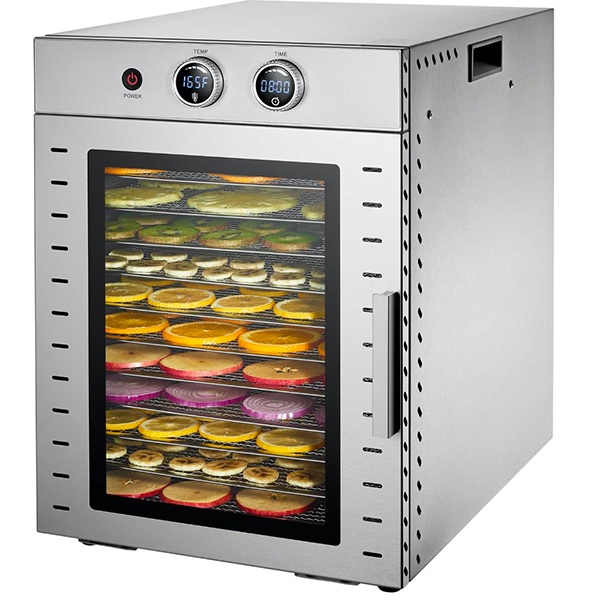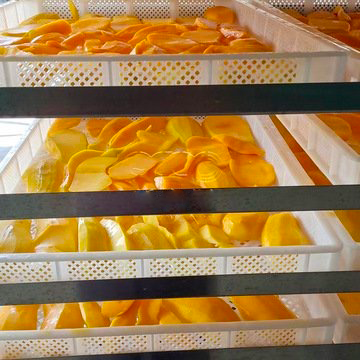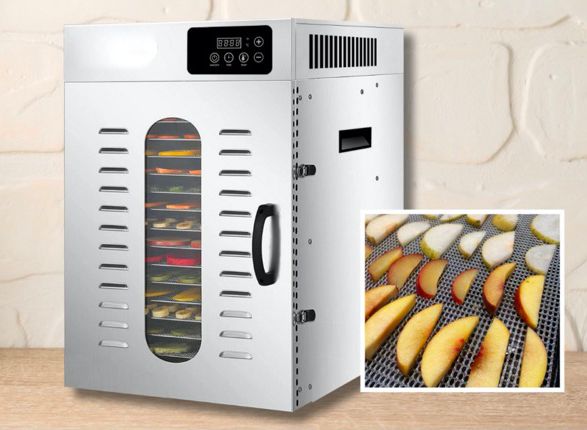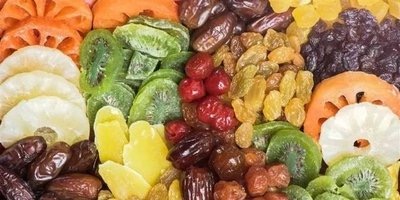
Content Menu
● Understanding Heat Pump Dryers
>> Key Components of Heat Pump Dryers
● The Importance of Weight in Heat Pump Dryers
>> Stability and Vibration Control
>> Insulation and Energy Efficiency
>> Durability and Longevity
● Performance Metrics Influenced by Weight
● Selecting the Right Heat Pump Dryer
● Advantages of Heat Pump Dryers Over Traditional Dryers
● Common Misconceptions About Heat Pump Dryers
● Practical Applications of Heat Pump Dryers in Food Processing
>> Fruit Drying
>> Vegetable Dehydration
>> Meat Preservation
● Innovations in Heat Pump Dryer Technology
● Environmental Considerations
● Conclusion
● FAQ
>> 1. What is a heat pump dryer?
>> 2. How does weight affect drying performance?
>> 3. Are heavier dryers more energy-efficient?
>> 4. What should I consider when buying a heat pump dryer?
>> 5. Can I use a heat pump dryer for all types of food?
In the realm of food processing, heat pump dryers have emerged as a revolutionary technology, offering efficient and effective solutions for drying various food products. As a leading manufacturer of food drying machines in China, we provide OEM services to international brands, wholesalers, and producers. This article delves into the intricacies of heat pump dryers, particularly focusing on how their weight can influence performance.

Understanding Heat Pump Dryers
Heat pump dryers utilize a sophisticated technology that recycles heat energy to dry food products. Unlike traditional dryers that expel hot air, heat pump dryers capture moisture from the food and recycle the heat generated during the drying process. This not only makes them energy-efficient but also preserves the nutritional quality of the food.
Key Components of Heat Pump Dryers
- Compressor: This component compresses refrigerant gas, raising its temperature and pressure.
- Evaporator: Here, the refrigerant absorbs moisture from the air inside the dryer, cooling down in the process.
- Condenser: The refrigerant releases heat as it condenses back into a liquid state, warming the air that is circulated back into the drying chamber.
- Expansion Valve: This valve regulates the flow of refrigerant into the evaporator.
The Importance of Weight in Heat Pump Dryers
The weight of a heat pump dryer can significantly impact its performance and efficiency. Here are some factors to consider:
Stability and Vibration Control
A heavier dryer tends to be more stable during operation. Stability is crucial for maintaining consistent airflow and temperature distribution within the drying chamber. If a dryer is lightweight, it may vibrate excessively during operation, leading to uneven drying results.
In commercial settings where large batches of food are processed simultaneously, stability becomes even more critical. A stable machine minimizes disturbances that could lead to product loss or quality degradation.
Insulation and Energy Efficiency
Heavier machines often incorporate better insulation materials. Good insulation minimizes heat loss, enhancing energy efficiency. This means that a heavier heat pump dryer can maintain optimal drying temperatures while consuming less energy.
Moreover, improved insulation contributes to noise reduction during operation. In environments where noise levels must be kept to a minimum—such as in residential areas or small-scale operations—this can be an essential factor.
Durability and Longevity
Weight can also be indicative of build quality. A heavier dryer is generally constructed with more robust materials, which can contribute to its durability and longevity. This is particularly important for commercial applications where the equipment undergoes continuous use.
Investing in a heavier, well-built dryer may lead to lower maintenance costs over time due to fewer breakdowns and repairs. Additionally, it can withstand harsher operational conditions without compromising performance.

Performance Metrics Influenced by Weight
Several performance metrics can be affected by the weight of a heat pump dryer:
- Drying Time: Heavier units may have more effective heat retention capabilities, leading to shorter drying times.
- Energy Consumption: A well-insulated, heavier dryer can reduce energy consumption by maintaining temperatures more efficiently.
- Product Quality: The stability offered by a heavier machine can result in better quality dried products due to uniform drying conditions.
- Moisture Removal Rate: Heavier dryers often have larger evaporators which can enhance moisture removal rates, ensuring that food products are dried thoroughly without retaining excess moisture.
Selecting the Right Heat Pump Dryer
When choosing a heat pump dryer for your food processing needs, consider the following:
- Capacity: Ensure that the dryer can handle your production volume.
- Weight: Opt for a model that balances weight with performance requirements.
- Energy Efficiency Ratings: Look for models with high energy efficiency ratings to save on operational costs.
- Brand Reputation: Choose reputable manufacturers known for quality and reliability.
- Maintenance Requirements: Consider how easy it is to maintain and service the machine. Heavier models may have more complex systems that require specialized knowledge for repairs.
Advantages of Heat Pump Dryers Over Traditional Dryers
Heat pump dryers offer several advantages compared to traditional drying methods:
- Lower Operating Temperatures: They operate at lower temperatures which helps preserve sensitive nutrients in food products.
- Reduced Energy Costs: Due to their ability to recycle heat, these dryers consume significantly less energy than conventional dryers.
- Environmental Impact: By using less energy and reducing waste heat emissions, heat pump dryers are more environmentally friendly options for food processing businesses.
- Versatility: They are suitable for a wide range of products including fruits, vegetables, meats, herbs, and even flowers.
Common Misconceptions About Heat Pump Dryers
Despite their numerous benefits, there are some misconceptions about heat pump dryers that need addressing:
1. They Are Too Expensive: While initial costs may be higher than traditional dryers, long-term savings on energy bills and maintenance make them cost-effective over time.
2. They Take Too Long to Dry Food: Although they operate at lower temperatures, advancements in technology have significantly reduced drying times compared to older models.
3. They Are Only Suitable for Large Operations: Heat pump dryers come in various sizes suitable for both small-scale and large-scale operations making them accessible for different business types.
Practical Applications of Heat Pump Dryers in Food Processing
Heat pump dryers find extensive applications across various sectors within the food industry due to their versatility and efficiency:
Fruit Drying
Fruits such as apples, bananas, and berries benefit significantly from being dried using heat pump technology. The low-temperature operation helps retain vitamins and antioxidants while achieving desired moisture levels efficiently.
For instance:
- Apple Chips Production: Using a heat pump dryer allows manufacturers to produce crispy apple chips without losing essential nutrients or flavor integrity.
- Dried Berries: Berries dried with this method maintain vibrant colors and flavors compared to those dried through conventional means which often lead to browning or loss of taste.
Vegetable Dehydration
Vegetables like carrots or bell peppers also see improved outcomes when dried using heat pumps:
- Carrot Flakes: These are popular in soups or snacks; using low-temperature drying helps preserve their natural sweetness.
- Herb Drying: Delicate herbs such as basil or oregano retain essential oils better when dried at lower temperatures offered by these systems compared to traditional methods which might scorch them.
Meat Preservation
Heat pumps are increasingly being utilized in meat processing as well:
- Jerky Production: The controlled environment allows for consistent moisture removal while preventing bacterial growth—essential for safe jerky production.
- Fish Drying: Fish can be dehydrated effectively without compromising texture or flavor when using advanced drying technology like this one.
Innovations in Heat Pump Dryer Technology
The field of food processing technology is continuously evolving with innovations aimed at improving efficiency further:
- Smart Controls: Modern units come equipped with smart controls allowing operators remote access via mobile apps; this enables monitoring performance metrics in real-time.
- Enhanced Sensors: Advanced sensors help ensure optimal conditions throughout each cycle by adjusting parameters automatically based on feedback received from monitored data points.
- Modular Designs: Some manufacturers now offer modular designs enabling businesses flexibility regarding scaling up production capabilities without needing entirely new systems—just adding additional modules as needed!
Environmental Considerations
As sustainability becomes increasingly important across industries—including food processing—heat pump dryers stand out due largely because they reduce carbon footprints through decreased energy consumption compared with traditional methods:
- Lower Emissions: By utilizing renewable energy sources alongside efficient designs (like those mentioned above), businesses can contribute positively towards environmental goals while enhancing profitability simultaneously!
Conclusion
In conclusion, while the weight of a heat pump dryer may seem like a minor detail at first glance; it plays an integral role influencing multiple aspects related directly back towards overall operational effectiveness within any given facility utilizing such equipment!
From ensuring stability during use down through improving energy efficiency levels—every consideration counts when selecting machinery tailored specifically towards unique needs within diverse sectors like food processing!
By carefully analyzing these factors alongside understanding practical applications available today—businesses stand poised not only maximize output but also maintain high standards regarding product quality—all while minimizing environmental impacts associated typically found within conventional approaches!

FAQ
1. What is a heat pump dryer?
A heat pump dryer is an advanced drying machine that uses a refrigeration cycle to remove moisture from food products while recycling heat energy for improved efficiency.
2. How does weight affect drying performance?
Heavier dryers tend to be more stable during operation, leading to better airflow and temperature control which results in more uniform drying.
3. Are heavier dryers more energy-efficient?
Yes, heavier dryers often have better insulation which reduces heat loss and helps maintain optimal temperatures with lower energy consumption.
4. What should I consider when buying a heat pump dryer?
Consider capacity, weight, energy efficiency ratings, brand reputation, and maintenance requirements when selecting a suitable heat pump dryer for your needs.
5. Can I use a heat pump dryer for all types of food?
Heat pump dryers are versatile and can be used for various food types including fruits, vegetables, meats, and herbs; however, it's essential to check specific model capabilities.












